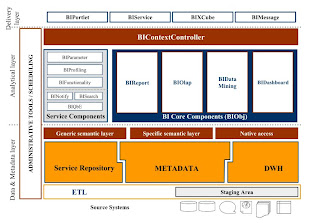Not all the SpagoBI modules are always necessary for every project: you can use the appropriate SpagoBI module for your project. You can start using a single module with the guarantee that further extensions will be easy because everything is inserted in an overall vision.
SpagoBI uses many technologies and products already available as Free Open Source Software: the first one is Spago,the J2EE Framework already released by Engineering Ingegneria Informatica S.p.A. and Sinapsi. Therefore, SpagoBI inherits Spago's features and technical characteristics, using them in its specific context:
* it manages specific Business Intelligence objects as reports, OLAP analysis, Dashboards and Scorecards views and Data Mining models;
* it is focused on data management and on information content and context;
* it supports the BI systems's administrators in the control, validation, certification and distribution process of the Business Intelligence objects.
According to its developement road-map, the main SpagoBI features will be the following:
* BI Portlets: every BI object will be distributed for the end-user through portlet technology (JSR 168). In this way portlets and the BI objects will be managed and encapsulated into the portal already chosen for the specific enterprise solution (even if the portal is realized by means of commercial products).
* Reporting, OLAP Analysis, Data Mining, geographical analysis, ETL processes, Dashboards and Scorecards are the BI objects managed by SpagoBI, everyone with its own execution engine and development environment. SpagoBI manages the production and validation cycles, the parametric activation, the navigation, the results versioning and storage in a similar way although every BI object maintains its distinctive characteristics.
o Reports realize the structured information views; they have a greater diffusion level according to a static structure (.pdf, .xls, .csv, .html, etc). SpagoBI enables the navigation capability between different reports, inheriting the parameters.
o The multidimensional structures for the OLAP analysis add a higher degree of freedom and variability. The analysis axis and the observation measures are structured, this enables to obtain a data examination at various detail levels and from various perspectives, by means of drill-down, drill-across, slice and dice operations.
o In the Management Performance context, SpagoBI provides many widgets for dashboards structuring and the parametric evaluation of performance scores.
o Data Mining algorithms and processes (Neural Networks, Decision Trees, etc.) enable data analysis, with the aim to find out hidden information. SpagoBI supports Data Mining models implementations and their results analysis trough the other Business Intelligence objects.
o Geographical analysis permit business data representation on geospatial maps.
o In the data extraction, transformation and loading (ETL) processes context, SpagoBI supports ETL processes execution; their results can be analyzed through other Business Intelligence SpagoBI platform tools.
* Query-by-example: it offers a visual mode for data inquiring. It is possible to save the structure as a template for subsequent reports development, or to export the results for external elaborations (ex. cvs, XML).
* Interaction with source systems: it provides connectors, protocols and services for bidirectional data exchange with source systems.
* Meta Repository: SpagoBI is a really integrated platform instead of a confused set of products thanks to metadata. The meta-repository contains all information about data (technical and business metadata), processes and rules for the platform management.
* Users profile: it is possible to differentiate the functionalities access rights according to the user's role.
* Documents management: it is a versioned repository for all the relevant results provided by the BI objects, in a scheduled way too. Research and detection functionalities for these documents are provided.
* Scheduling: an off-line activation of all transport and/or import/export data processes, document production, storage and destruction, etc. is provided.
* Workflow: SpagoBI manages the approval and certification flow for BI objects and for the relative elaborated documents.
* Administration: it concerns in a support to the management functionalities of the whole platform.
* Logging/Auditing: corresponding to some control services for the platform's functional and performance monitoring.

Ref:http://www.google.lk/search?q=spagoBI+features&ie=utf-8&oe=utf-8&aq=t&rls=org.mozilla:en-US:official&client=firefox-a
Reference :-http://spagobi.eng.it/SpagoBISiteENG/target/docs/features.html
Date- 2010-04-02

Any idea if we can pull data from MS Access into SpagoBI?
ReplyDelete